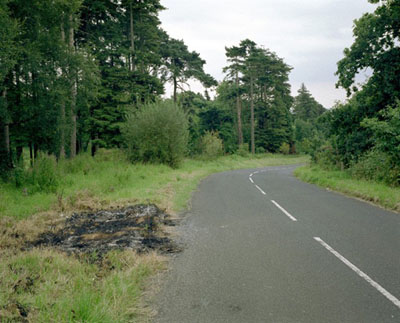 from the series "Boom Town", 2002 John Duncan Belfast seems a familiar city: images of it have been in over-circulation during the "troubles". John Duncan has been making photographic work in Belfast over the last decade as the city has been affected by the Peace Process, the ceasefires, the influx of capital investment and as it has slipped off the front pages. His images depict Belfast as it is dragged into the contemporary world, while remaining conscious of it as a place that resists standardisation and normalisation. In the earliest series "Boom Town" we see evidence of the new city being put in place. The city under construction inevitably looks theatrical, like a set: something unreal made to resemble something real. A divergent strand in the work draws on the artist's experience of moving from the more affluent South of the city to North Belfast and being confronted first hand by the sectarian tensions that continued to mar this area. An image of a relatively ordinary street turns out on closer inspection to be littered with debris from the aftermath of a riot. In these images old history asserts itself in all too familiar ways. "Trees From Germany" explores more directly the interfaces that have been created between the new developments and some of the existing communities in the city. In an image made in the city centre we see the lawn in front of the new Days Hotel being rolled out towards a paramilitary mural. The hotel reappears again in the next image competing on the skyline with a Twelfth of July bonfire, part of Protestantism's annual celebration of their perceived victory over Catholicism, at the Battle of The Boyne in 1690. A few streets away Duncan moves inside the protected space offered to apartment dwellers. Another bonfire protrudes into the view from the roof garden of these apartments in a Loyalist area recently colonised by developers. The contrasts illustrate the battle going on for Belfast's future. The most recent series "We Were Here" looks at the demilitarisation that is taking place as part of the peace process. At Girdwood army barracks in North Belfast, successive army regiments marked their tour of duty by painting operational banners on the internal walls of the base. During the handover to civilian contractors dismantling the base, these have been painted out. This series continues Duncan's examination of the rebuilding and re-imagining of Belfast. John Duncan studied photography at Newport and Glasgow School of Art. He has exhibited widely, including exhibitions at Stills Gallery, Edinburgh 1998, The Gallery of Photography, Dublin 2002, NGBK Berlin, 2003; and EAST International, Norwich, 2006. Exhibition: 23 November - 13 January 2006 Gallery hours: Mon-Fri 10 am - 5.30 pm, Sat 11 am - 4 pm Gimpel Fils Downstairs 30 Davies Street GB-London, W1K 4NB Telephone +44 20 7493 2488 Fax +44 20 7629 5732 Email info@gimpelfils.com www.gimpelfils.com As part of Gimpel Fils continuing commitment to contemporary art, Downstairs opened in November 2004 as a dedicated project space, showcasing challenging and experimental artwork. Downstairs has its own exhibition programme comprising solo shows by emerging and established artists who have not previously exhibited at the gallery. |